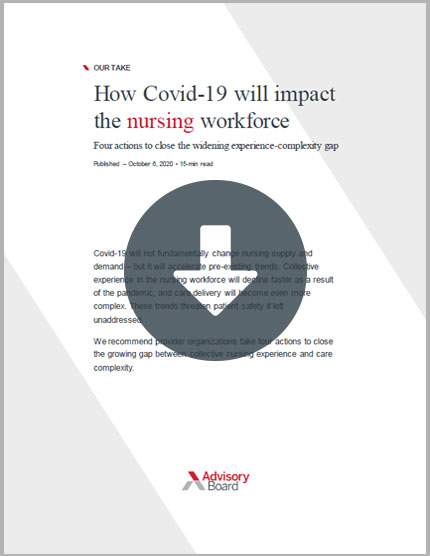Auto logout in seconds.
Continue LogoutMost U.S. nurses were satisfied with their jobs during the first half of 2020—but amid the novel coronavirus pandemic, many more nurses reported feeling burned out when compared with periods before the pandemic, according to Medscape's Nurse Career Satisfaction Report 2020.
Report details
For the report, which Medscape released last month, the publication surveyed 10,424 nurses, including:
- 5,130 RNs;
- 2,002 nurse practitioners (NPs);
- 2,000 licensed practical nurses (LPNs);
- 500 clinical nurse specialists (CNSs);
- 401 nurse midwives (NMs); and
- 391 certified nurse anesthetists (CRNAs).
Medscape notes that it conducted the survey "over the summer, before the start of the huge spike in [Covid-19] cases that began overwhelming the health care system in the fall." As such, "[n]urses in some parts of the country had yet to experience the hardships of dealing with a Covid-19 surge of this magnitude"—meaning the survey's findings might not accurately reflect how nurses are feeling about their jobs now, Medscape reports.
How the pandemic affected nurses—and their job satisfaction
Overall, the survey found that the percentage of respondents who reported having tested positive for the coronavirus was low among all subsets. According to the survey, LPNs were the most likely among the respondents to report having tested positive for the novel coronavirus, at 6%, or to have not tested positive but to have been presumed positive for the virus, at 5%.
The survey also showed that most nurses did not have their work settings change as a result of the pandemic. CNSs were the most likely to report that they were required to shift to a different work setting for all or part of the time because of the pandemic, at 29%. In addition, CNSs were tied with NPs as the most likely to report voluntarily shifting to a different work setting for all or part of the time because of the pandemic, at 11% each.
Further, the survey showed that most RNs, LPNs, NPs, CNSs, and NMs at the time of the survey believed the pandemic wouldn't have a major effect on their annual incomes for 2020. However, the survey found that 59% of CRNAs believed their annual salaries would decrease in 2020 because of the pandemic, while 22% of LPNs believed their annual salaries would increase in 2020 because of the pandemic.
According to the survey, more nurses reported being "very" or "somewhat" burned out during the pandemic when compared with the period before the pandemic began. For example, Medscape notes that the percentage of RNs who reported being "very" or "somewhat" burned out increased from 12% before the pandemic began to 37% during the pandemic. LPNs, NPs, CNSs, CRNAs, and NMs saw similar increases in reported levels of burnout, the survey showed.
Ultimately, the survey showed that the pandemic drove down career satisfaction among some nurses, but the majority of nurses reported no change in their career satisfaction as a result of the pandemic.
How nurses feel about their jobs overall
In addition, when asked whether they were happy with their decisions to become nurses, the vast majority of RNs, LPNs, NPs, CNSs, CRNAs, and NMs reported being glad they entered the profession, and most nurses said they would choose the profession again.
Despite challenges in the profession, nurses reported finding some aspects of their jobs rewarding. For example, 31% of RNs and 39% of LPNs reported helping people and making a difference in people's lives as the most rewarding aspect of their jobs.
(Frellick, Medscape, 12/24/20; Stokowski et. al., Medscape Nurse Career Satisfaction Report 2020, 12/24/20).

Covid-19 will not only fundamentally change nursing supply and demand – it will also accelerate pre-existing trends. Collective experience in the nursing workforce will decline faster as a result of the pandemic, and care delivery will become even more complex. These trends threaten patient safety if left unaddressed.
We recommend provider organizations take four actions to close the growing gap between collective nursing experience and care complexity.
Don't miss out on the latest Advisory Board insights
Create your free account to access 1 resource, including the latest research and webinars.
Want access without creating an account?
You have 1 free members-only resource remaining this month.
1 free members-only resources remaining
1 free members-only resources remaining
You've reached your limit of free insights
Become a member to access all of Advisory Board's resources, events, and experts
Never miss out on the latest innovative health care content tailored to you.
Benefits include:
You've reached your limit of free insights
Become a member to access all of Advisory Board's resources, events, and experts
Never miss out on the latest innovative health care content tailored to you.
Benefits include:
This content is available through your Curated Research partnership with Advisory Board. Click on ‘view this resource’ to read the full piece
Email ask@advisory.com to learn more
Click on ‘Become a Member’ to learn about the benefits of a Full-Access partnership with Advisory Board
Never miss out on the latest innovative health care content tailored to you.
Benefits Include:
This is for members only. Learn more.
Click on ‘Become a Member’ to learn about the benefits of a Full-Access partnership with Advisory Board
Never miss out on the latest innovative health care content tailored to you.

